Search Results for Tag: Permit
Penalty for fake Everest permit
If it is about its own income, the Nepalese government can’t take a joke. According to the newspaper “The Himalayan Times”, the Ministry of Tourism has fined Nepalese expedition operator “Seven Summit Treks” 44,000 dollars for forging a permit for Mount Everest. In spring, the authority granted a permit to an expedition led by the Chinese Sun Yiguan and managed by “Seven Summit Treks” to climb the highest mountain on earth. The original document was issued for twelve member. Later a fake version appeared in which an Australian and a Chinese climber had been added.
![]() read more
read more
China cancels fall season on Tibet’s eight-thousanders
This was not a good week for Janusz Adamski. First, the Nepalese government seized his passport and informed the Pole that he would be not allowed to enter Nepal for mountaineering in the next ten years. And now, the Chinese authorities made the 48-year-old the scapegoat for not issuing any permits next fall for the three eight-thousanders in Tibet. Adamski, who “illegally” scaled Mount Everest from the north side and then traversed to the south side on 21 May, was responsible that the rules and regulations had to be “adjusted and improved”, informed the China Tibet Mountaineering Association (CTMA). To ensure that the problems were solved in time by 2018, there would be no climbing permits for fall 2017, said the CTMA.
![]() read more
read more
Everest aspirant caught without permit
Actually, the first summit successes on Mount Everest had been expected for the past weekend. However, the Sherpa team that wanted to fix the ropes up to the highest point on 8,850 meters on the Nepali south side of the mountain had to turn around because of strong winds. And now it’s snowing. Snowfall is also expected for the next days. After all, the weather forecast for this week predicts little wind in the summit area. Maybe something will be still possible. This does not apply to Ryan Sean Davy. The 43-year-old South African was caught in Everest Base Camp without permit and sent back to Kathmandu.
![]() read more
read more
Everest autumn climbers this time in spring
Actually, both wanted to return to the highest mountain on earth next fall. But the Chinese put a spoke in their wheels. The authorities in Tibet will not issue any permits for Mount Everest in fall 2017. For this reason, the Japanese Nobukazu Kuriki as well as the Spaniard Kilian Jornet join the crowd of those who want to climb Everest from the Tibetan north side this spring. The 34-year-old Kuriki has already arrived in Chinese Base Camp at 5,200 meters. Kuriki has announced that he wants to climb up to 7,500 meters on the normal route. Subsequently, he wants to try again to climb through the North Face, solo and without bottled oxygen.
![]() read more
read more
China fuels the price spiral – and invests
Climbing on an eight-thousander in Tibet is getting more expensive, not only on Mount Everest. According to documents available to me, the Chinese Mountaineering Association (CMA) has significantly increased the prices for the climbing permits on Everest, Cho Oyu and Shishapangma, on average by more than 30 percent. Since the beginning of the year, the CMA claims 9,950 US dollars per mountaineer for the climb of the highest mountain on earth in case of four or more team members. So far the Everest Permit cost about 7,000 dollars per head. 7,400 dollars are now due for Cho Oyu, 7,150 dollar for climbing Shishapangma from the north side and 7,650 dollars for an ascent from the south side of the mountain. For smaller teams of up to three, the permit costs are even in a five-digit range: 19,500 dollars per person on Everest, 12,600 dollars each on Cho Oyu and Shishapangma.
![]() read more
read more
Bad mountain management in Nepal
You can’t just set off. If you want to climb am mountain in Nepal you should check the rules beforehand, otherwise you might experience a nasty surprise. Like the three Spanish climbers, who recently opened new routes on two six-thousanders. They were under way without permits, now the authorities in Kathmandu are investigating the case. They are facing a stiff fine and a 10-year-ban from mountaineering in Nepal. My compassion for the Spaniards is limited. I find their justification (“We are not pirates, we have left our money in Nepal at all”) flimsy. If you follow this argumentation, you could bilk any national park fee worldwide. Nonetheless there have been some construction sites the Nepalese “mountain management” for a long time, which are allegedly worked on but whose status does not change.
![]() read more
read more
Pakistan refuses climbers entry – arbitrariness or system?
You have a visa for Pakistan, a climbing permit for an eight-thousander, you have organized everything. You travel to Islamabad and at the airport you learn that you are a persona non grata and have to leave the country. That’s exactly what happened to the Australian-New Zealand climber Chris Jensen Burke (she has both citizenships) and the Nepalese Sherpa Lakpa Sherpa. “The reasons why are stranger than fiction and I won’t put the detail here,” Chris wrote in her blog. Obviously she fears to risk alienating the Pakistani authorities if she is quite clear.
![]() read more
read more
Blockade in Nepal declared ended
Two reasons to celebrate in Nepal: Just in time for Losar, the Tibetan New Year, an end of the supply crisis in the Himalayan state is on the horizon. After more than four months, leaders of the Madhesi ethnic group declared their blockade of the border with India ended. The Madhesi, who live in southern Nepal, felt disadvantaged by the country’s new constitution. Meanwhile, it has been changed in some respects. The blockade had paralyzed Nepal. The reconstruction work after the earthquake in spring 2015 had come to a virtual standstill. Fuel and building materials as well as food and medicine had run short because the imports from India had been staying away. Since the weekend, tank trucks are rolling towards Kathmandu again.
![]() read more
read more
UIAA supports stricter rules on Everest
Backing for the Nepalese authorities: The International Climbing and Mountaineering Federation (UIAA) “fully supports the decision to propose more stringent measures for climbers wishing to scale the world’s highest peak, Mount Everest (29,029ft / 8,848m)”, as it said. These measures will include individuals having to prove they have already scaled a peak higher than 6,500 meters, thus eliminating the possibility of novice climbers scaling the mountain. “Everest should become a mountaineers’ mountain again”, said UIAA president Frits Vrijlandt.
![]() read more
read more
The real blind on Everest are the inexperienced
The Nepalese government has triggered a medial avalanche. A week ago, Tourism Minister Kripasur Sherpa mentioned the possibility of stricter rules on granting permits for Mount Everest. The government is considering age limits – from 18 to 75 years – and a reduction of permits for disabled climbers. “The disabled or visually impaired people usually need someone to carry them, which is not an adventure”, Sherpa said. “Only those who can go on their own will be given permission.” The American Erik Weihenmayer, in 2001 the first blind person ever to climb Mount Everest, is outraged. The statement is an overreaction that represents the biases, prejudices and superstition that are very prevalent in Nepal government, Erik writes on Facebook: “It’s a shame that the Minister of Tourism is using the tragedies of the last two years to scapegoat the tiny number of disabled climbers and enact a policy that won’t fix the problem. Frankly, being faced with additional challenges, disability, age, etc. forces a climber to be more prepared and make more cautious decisions.”
![]() read more
read more
Dawa Steven Sherpa: “Ke garne! We carry on!”
There is a jinx on it. Two spring seasons on Everest in a row remained without summit successes (I ignore those of the Wang Jing team in 2014 because they were flown by helicopter to the high camp). In 2014, all commercial expeditions were cancelled after an avalanche had killed 16 Nepalese climbers in Khumbu Icefall. This year, the devastating earthquake in Nepal triggered an avalanche from the seven-thousander Pumori hitting Everest Base Camp and killing 19 mountaineers and support staff. Once again the spring season ended before it had really begun. What does this mean for the Sherpa people?
I called Dawa Steven Sherpa. Along with his father Ang Tshering Sherpa, the president of the Nepal Mountaineering Association (NMA), the 31-year-old is managing “Asian Trekking”, a Kathmandu-based leading operator for expeditions and trekkings in the Himalayas. Dawa Steven scaled Everest twice (in 2007 and 2008) and in addition the eight-thousanders Cho Oyu (2006) and Lhotse (2009). Under his expedition leadership more than 150 climbers have summited Everest. But Dawa Steven is also a tireless fighter for environmental and climate protection in the Himalayas. Furthermore he is leading “Resilient Homes” , a project of the “Himalayan Climate Initiative” to help earthquake-affected communities to rebuild their houses and other buildings – one more reason to talk to him about the current situation in Nepal.
![]() read more
read more
PR with a permit
The despair in Nepal must be great. There is no other explanation for the fact that the government in Kathmandu called a press conference these days only to hand out a permit for an expedition. Japanese climber Nobukazu Kuriki received the written permission to climb Mount Everest this fall from the hands of Tourism Minister Kripasur Sherpa. “Kuriki is climbing at a time when there is confusion in the world about the safety in Nepal after the earthquake”, the Minister said. “This will be an example for other visitors to come to Nepal which is safe for mountain climbing.” The 33-year-old Japanese climber sang the same tune: “The main purpose of my climb is to spread the message that Nepal is safe for climbers and trekkers even after the earthquake.”
Kuriki – as reported – wants to climb Everest from the Nepal side, after the Chinese authorities gave all expeditions to Tibet the cold shoulder. Today Kuriki flew from Kathmandu to the Khumbu region for acclimatization. In 2012, in his last attempt to climb Everest in fall, the Japanese had suffered severe frostbite. Nine fingers had to be amputated. Like then, Kuriki again plans to climb solo and without bottled oxygen, this time on the normal route. The “Icefall Doctors” will prepare for him the route through the Khumbu Icefall.
![]() read more
read more
Everest permits extended
This decision was really overdue. The Nepalese government finally decided that the permits to climb Mount Everest in 2014 remain valid until 2019. Shortly after the avalanche in the Khumbu Icefall on 18 April 2014 that had killed 16 Nepalese climbers, the spring season de facto had been terminated. More than 330 foreign climbers left the highest mountain in the world, without having set foot on it. Even then government officials in Kathmandu announced that the permits for the 39 expedition groups would retain their validity for five years. However, the words were not followed by deeds. Instead, there were rumors about government plans to extend the permits only for groups. The climbing scene was outraged rightly. If in this case e.g. only one climber would have used the permit of 2014 to climb Everest in 2015, the other group members not in attendance would have been empty handed. Now, this regulation is apparently off the table.
![]() read more
read more
Climbers’ crowdfunding for winter expeditions
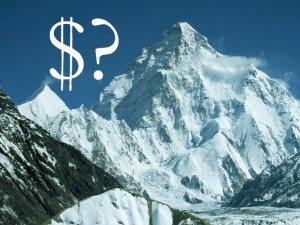 Is it just a coincidence or already a trend? The K 2 winter expedition of Denis Urubko and Italian climber Daniele Nardi’s to Nanga Parbat use crowdfunding on the Internet to get more money for the expedition budget. Anyone who had ever to write his fingers to the bone to raise money for an expedition, will understand that now climbers too choose this form of financing that was born in the digital age.
Is it just a coincidence or already a trend? The K 2 winter expedition of Denis Urubko and Italian climber Daniele Nardi’s to Nanga Parbat use crowdfunding on the Internet to get more money for the expedition budget. Anyone who had ever to write his fingers to the bone to raise money for an expedition, will understand that now climbers too choose this form of financing that was born in the digital age.
![]() read more
read more
Prolonged Everest permits for groups only?
Maybe it will turn out to be not quite as bad as it looked first. A report of the Himalayan Times about the Everest permits has upset many mountaineers worldwide – including myself. The report said that the extension of last spring’s Everest permits by five years would apply strictly to groups not to individual climbers. Means: If even one member of an expedition would scale the mountain, permits of the other group members would be cancelled. After the avalanche accident in the Khumbu Icefall last April that had killed 16 Nepalese climbers and led to the premature end of the spring season, the government had announced that the 318 departed climbers could use their permits even within the next five years.
![]() read more
read more



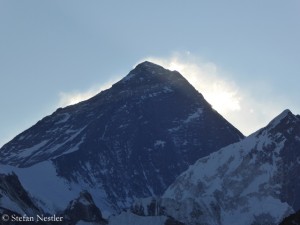

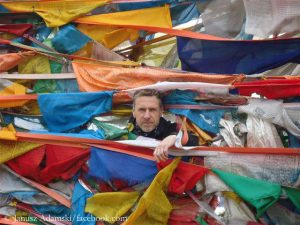
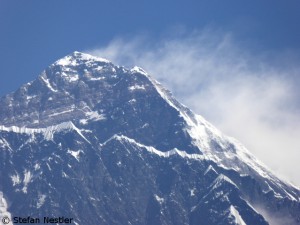
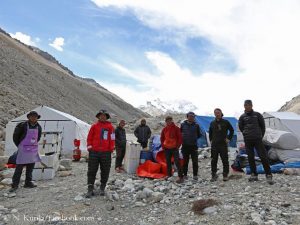
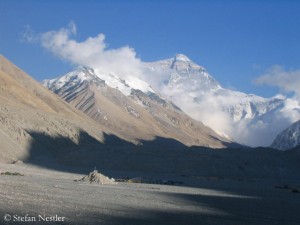
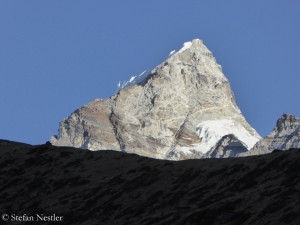
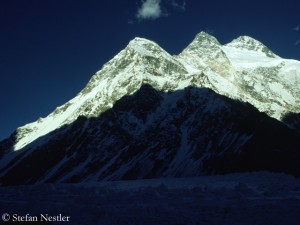
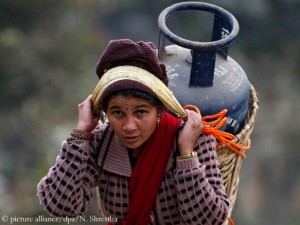
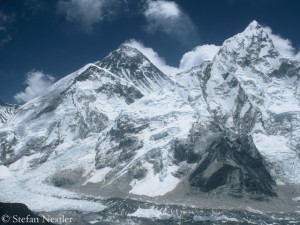

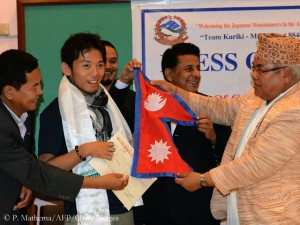
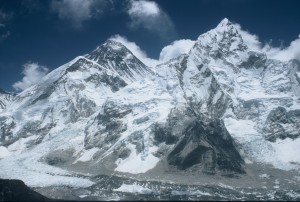
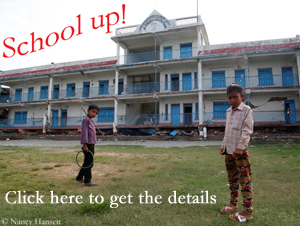
Feedback